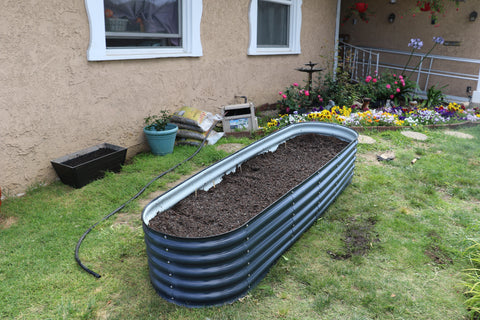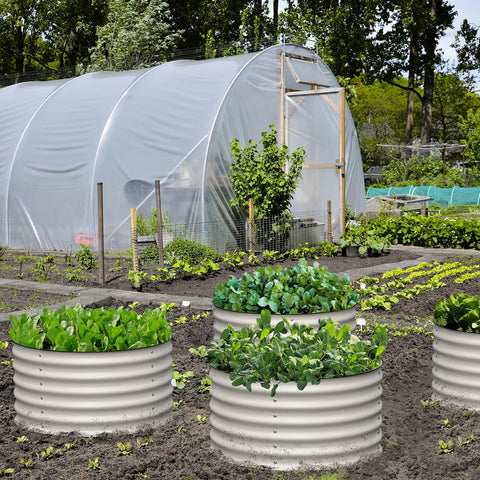Tips from Olle Garden Bed: Are Plastic Containers Safe For Gardening?
Gardening is a good way to reconnect with nature and grow your own food, but what happens when you only have plastic containers? Growing your own food is the first step to self-sufficiency, but perhaps you lack space? Container gardening is a fashionable choice for many gardeners because they can grow various plants in lightweight plastic containers that are easy to move, maintain and replace. However, if you pay attention to health, you may want to know how planting plants in plastic containers affects your health. The following content also has some reference value for raised garden beds.
So, are plastic containers safe for gardening? Should you worry that the soil and plants will absorb the chemicals leached from the plastic? Learn more about how plastic containers shape your gardening style below!

Learn about plastic containers for gardening
Although plastics look and feel the same, they have different variations, categories, and types. For example, the plastic used to make baby bottles is different from the plastic used to make recyclable water bottles.
To help people understand the types of plastics they use, the Plastics Industry Association (SPI) introduced the Resin Identification Code (RIC) in 1988. This helps people consciously choose the type of plastic they want to touch.
Today, ASTM International Controls Plastic Resin Number Regulations.
So what do these numbers mean?
If you turn a plastic container or bottle upside down, you will see a triangle with a number inside:
- Polyethylene terephthalate (PET or PETE)
It is used to manufacture disposable plastic cans and containers. It is recyclable. Do not grow anything in it, because it is easy to decompose in light and heat. Use it as a temporary clock tower for seedlings.
- High density polyethylene
Used to make cloudy milk and detergent bottles. Extremely heat-resistant, not easy to decompose. It is recyclable. You can use it to carry liquids, i.e. water, fertilizer, feed, etc. You can even use it to DIY the scarecrow to drive away birds.
- PVC
Used to manufacture pipes, trolleys and large detergent containers. There are recycling restrictions. Gardening is not safe because continued exposure to high temperatures can lead to chemical leaching.
- Low density polyethylene
It is used to manufacture garbage bag lining, food containers, shrink packaging and extrusion bottles. Generally not recyclable. In your garden, you can use this type of plastic to store soil or cover your hoop house.
- Polypropylene
Used to make straw, bottle cap and microwave oven container. Recyclable unless black. You can use this plastic for flower pots, plant trays, ropes, and nets. This is because it has good wear resistance.
- Polystyrene (PS)
It is used for packaging peanuts, polystyrene foam plastic articles and delivery containers. Not recyclable. Do not use styrene as it is classified as a possible human carcinogen by the International Agency for Research on Cancer (IARC).
- All inclusive. It includes acrylic acid, nylon, polycarbonate containing BPA and polylactic acid.
Used to make sunglasses, goggles, mobile phones and CDs. Do not use this plastic in your garden because it may contain BPA that is harmful to your health.
I hope this list will help you find new planters. Some plastics are not suitable for planting. Chemical leaching is something that all gardeners should pay attention to.

Use plastic safely in the garden
Each RIC is made of different kinds of plastics and has the unique property of leaching chemical substances. You guessed right, they are also decomposed in different ways. Understanding the type of plastic you handle in your garden is critical to understanding how it affects your personal health.
Do not use any plastics containing RIC3, 6 and 7, because they are unsafe. When you often expose them to heat and light, they may immerse harmful chemicals in the soil.
Most gardeners believe that wood, metal, bricks and stones are the best planting materials. However, if you cannot use these materials and prefer plastics, please use RIC5 to grow edible crops and RIC1, 2, 4 and 5 to grow other non edible plants.
You can safely use plastic in your garden, but you need to monitor the type of plastic used to grow plants. Have fun, but be careful!
Tips for planting plants in plastic containers
In addition to knowing what type of plastic you are using, it is also important to learn how to use it correctly. The correct use of safe plastics will help extend their service life, prevent material compromise, and limit or prevent chemical leaching. In the long run, this will be economically advantageous because you do not need to change the flowerpots or bags frequently.
- Do not expose the plastic pan to extreme high temperature
When it is too hot outside, even if they like sunshine, it is too hot for the plants growing in the pot. If your flowerpot is on the balcony, please purchase high-quality waterproof and weatherproof curtains, such as Bonzer's transparent outdoor curtains, to protect them from long-term exposure to direct sunlight. If your plastic pans are exposed to direct sunlight every day, they will degrade, shatter and crack faster than expected.
- Do not buy black or dark pots
The secret of heating is to put the black pot in direct sunlight! This is because dark colors absorb sunlight and convert it into heat. Although the black flowerpot will not bake your plants, if you put them under direct sunlight, the soil water will evaporate faster, making it dry. From the perspective of the pot, this may lead to breakage. If you have no choice but to buy dark flowerpots, please buy some shade to prevent long-term exposure to direct sunlight.
- Use potted soil with high organic content
According to research, soil with high organic content will degrade pesticides and prevent them from seeping into groundwater. This is because pesticides automatically attach to organic matter. When you add organic matter to the soil, you usually mix it three to five inches above the top of the soil.
According to the study, the more organic matter in the soil, the higher the chance that pesticides will be "retained" a few inches on the top of the soil. Therefore, placing potted soil with high organic content in plastic containers can help capture BPA and other leached chemicals (if any) and prevent them from reaching the roots.

Lettuce Romance calm!
Plastic containers, even those considered safe for gardening, may release small amounts of chemicals into the soil - but safe plastic will soak small amounts of chemicals into the soil.
Use RIC5 to grow edible crops, and avoid using RIC3, 6, and 7 for horticultural purposes because they can immerse hazardous chemicals in the soil, causing various health problems. Please contact your local authority to learn how to safely dispose of unusable plastics.
Happy gardening!
